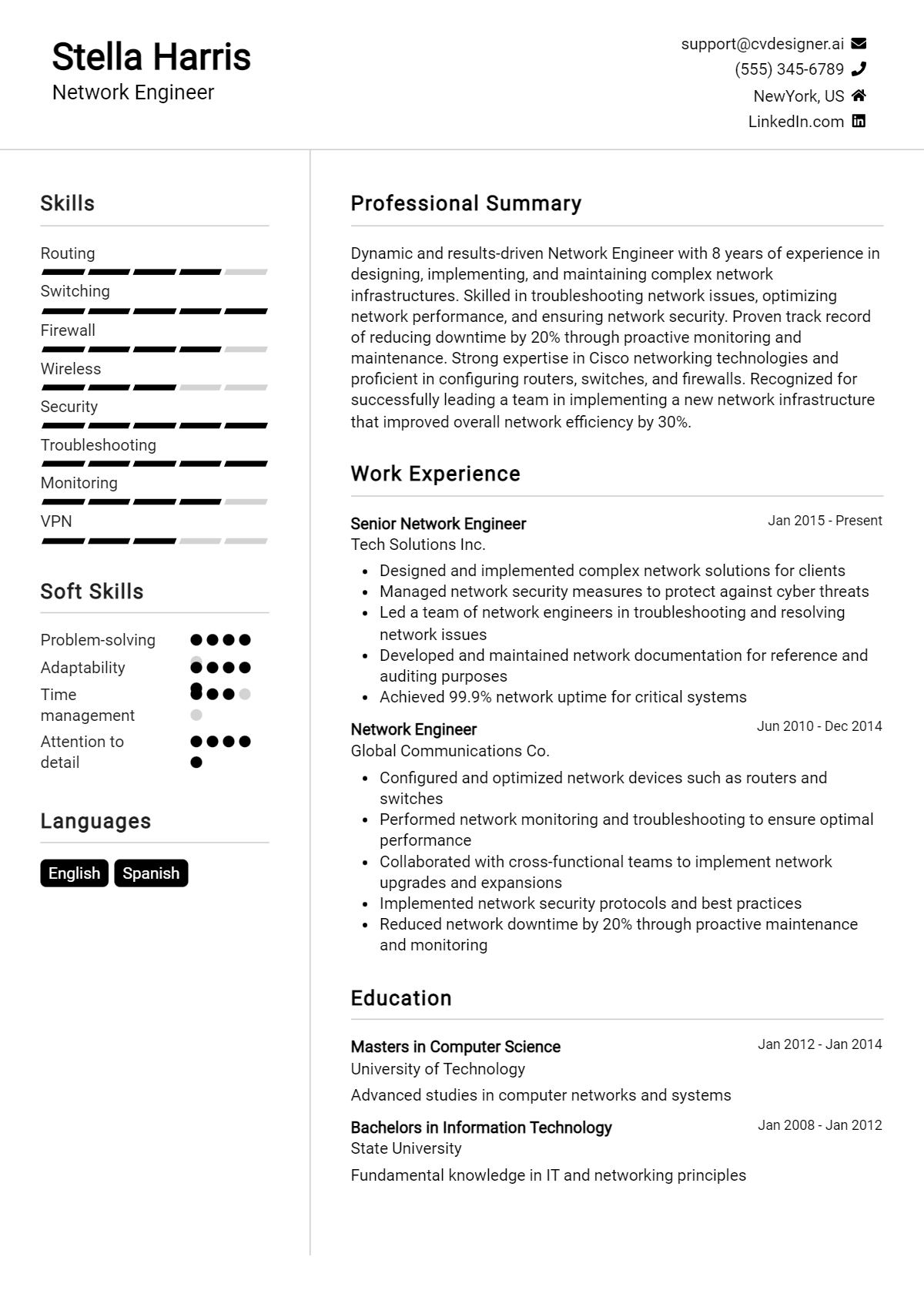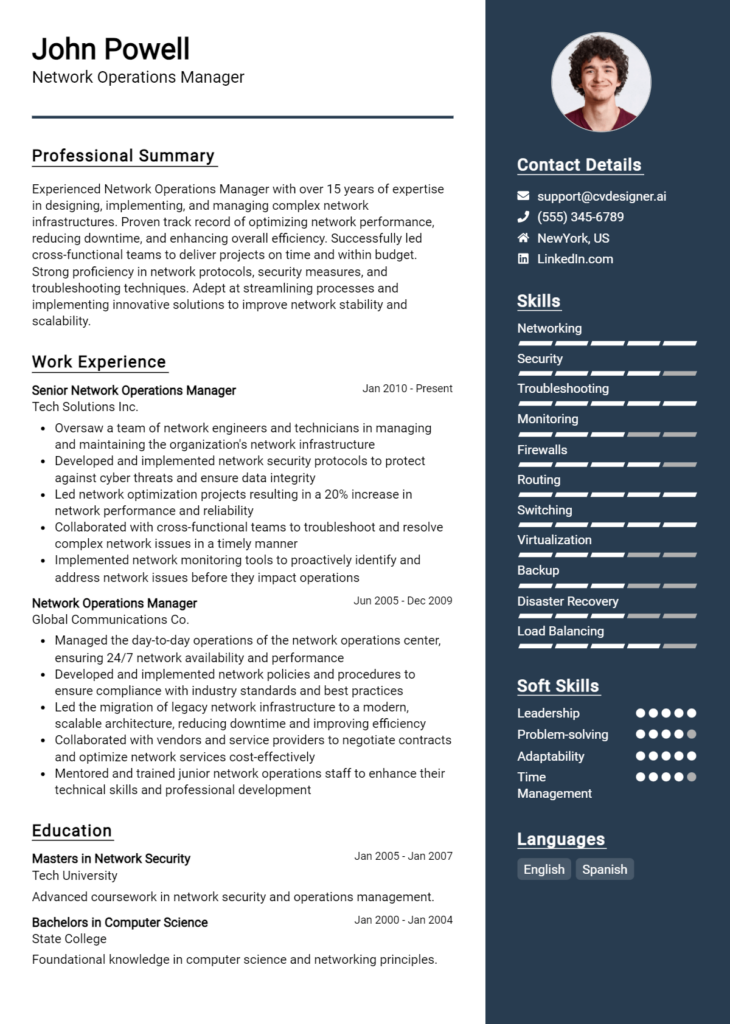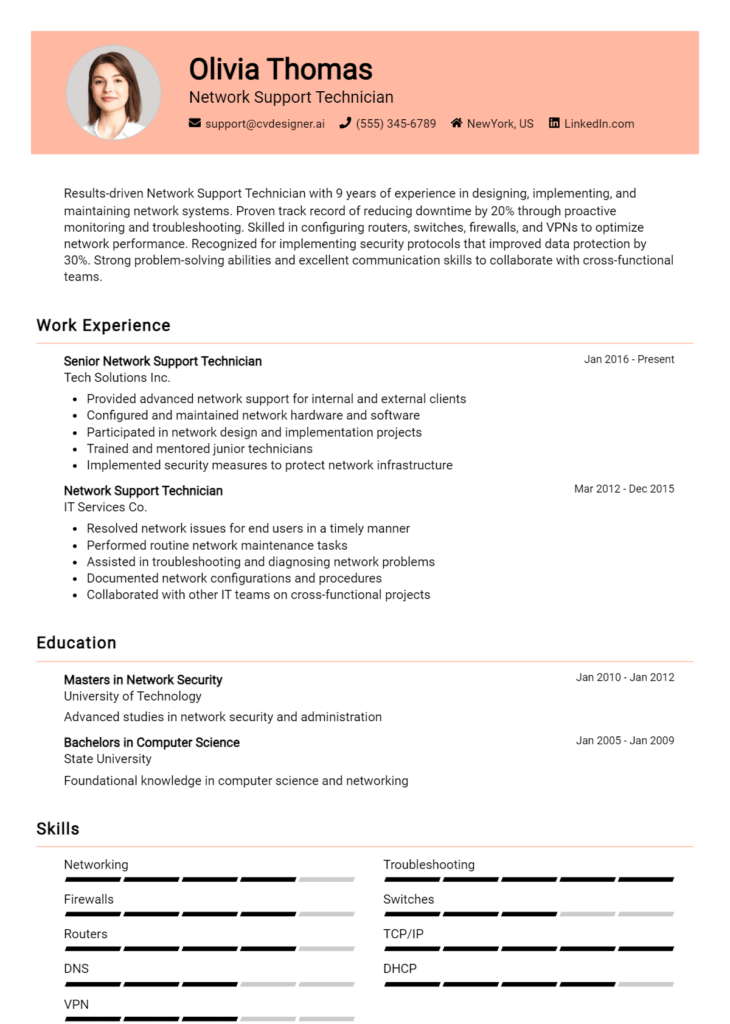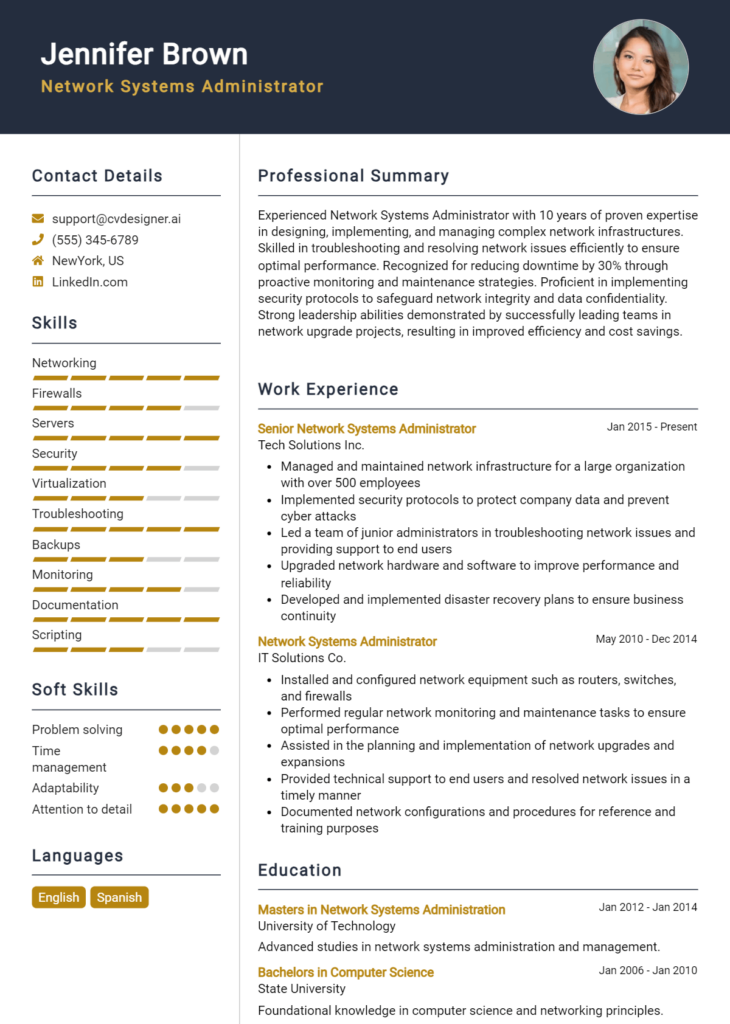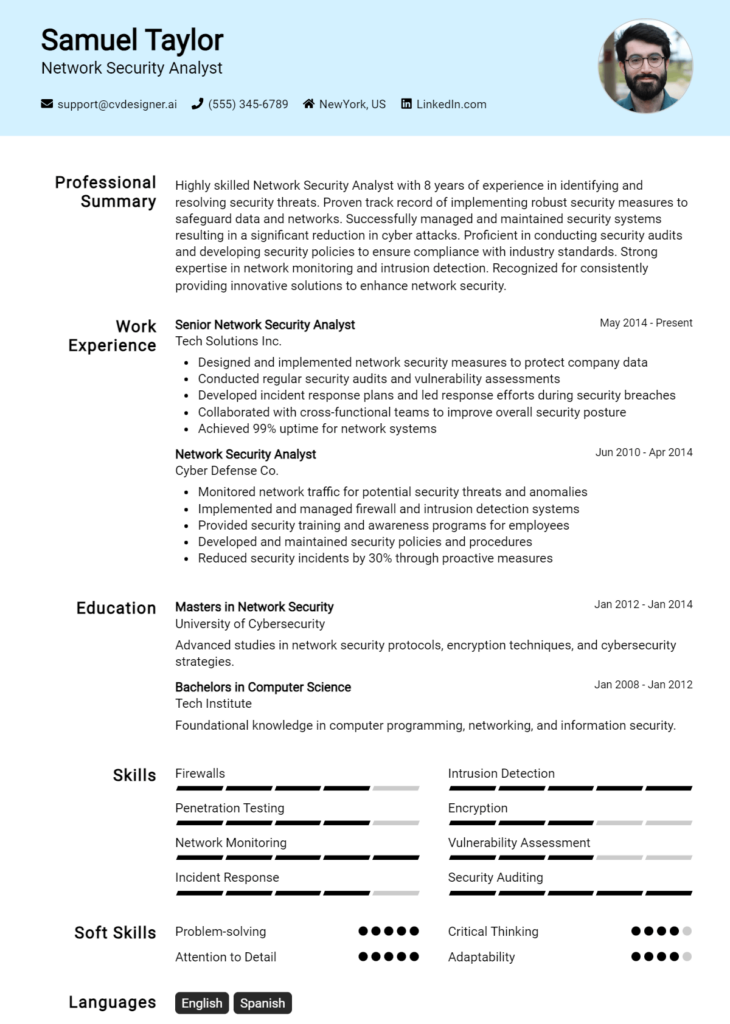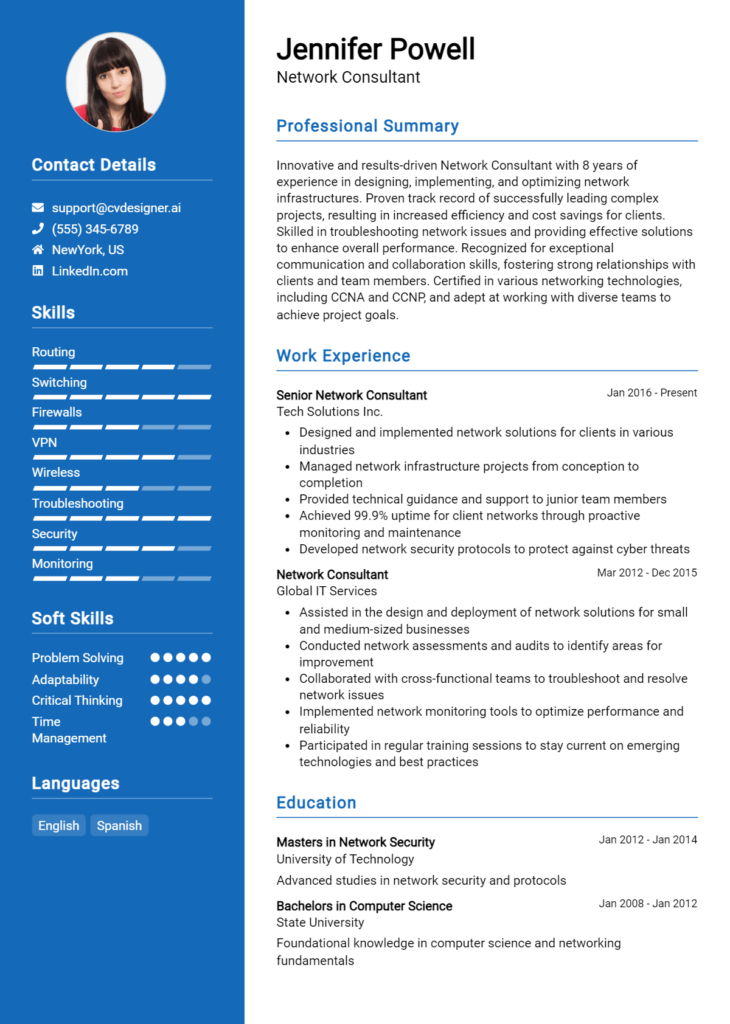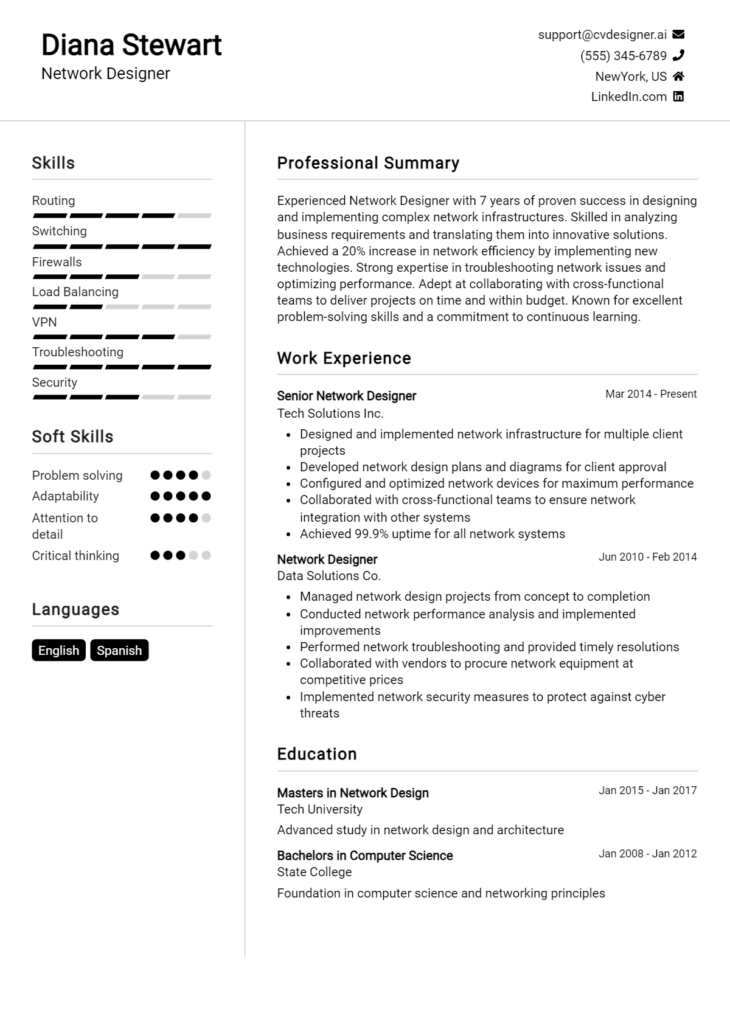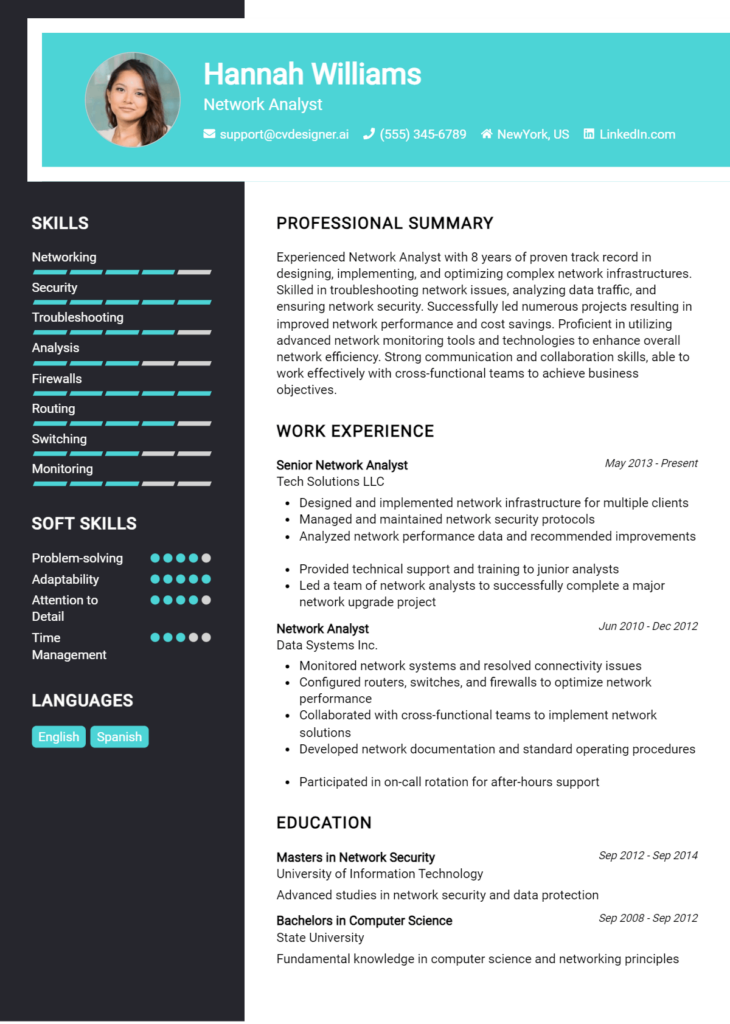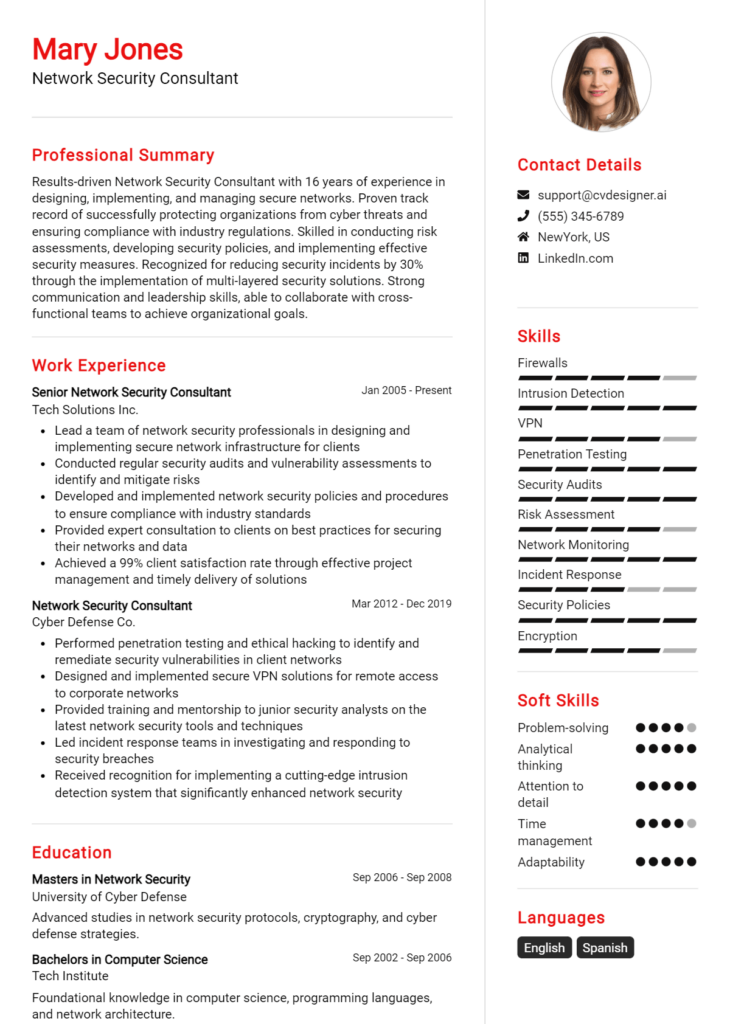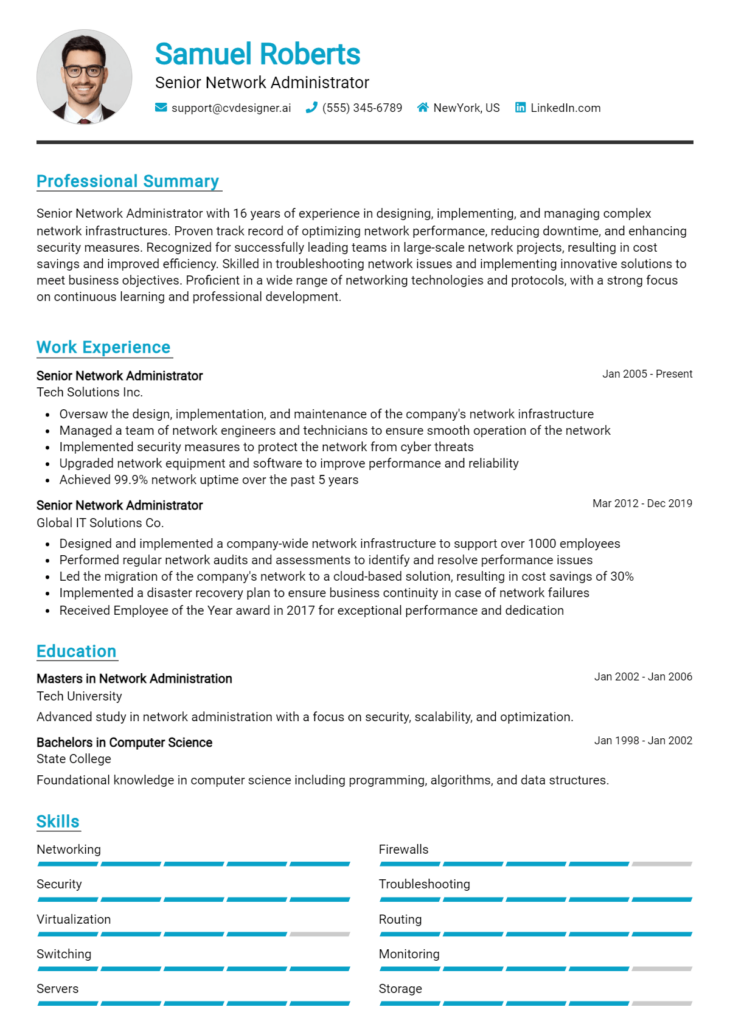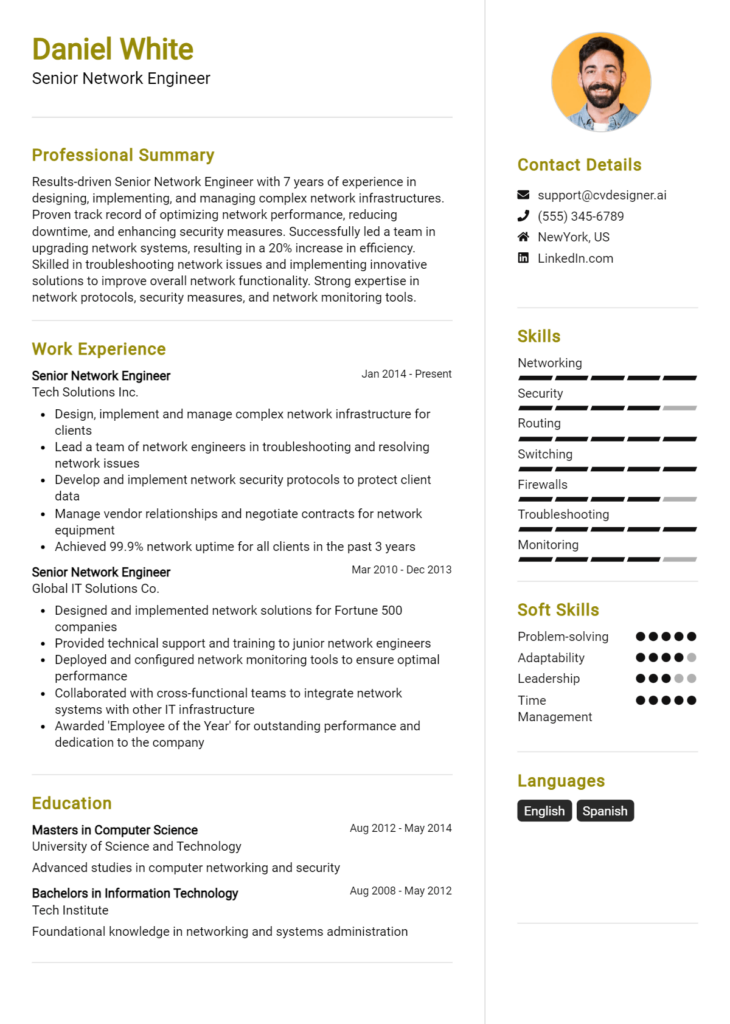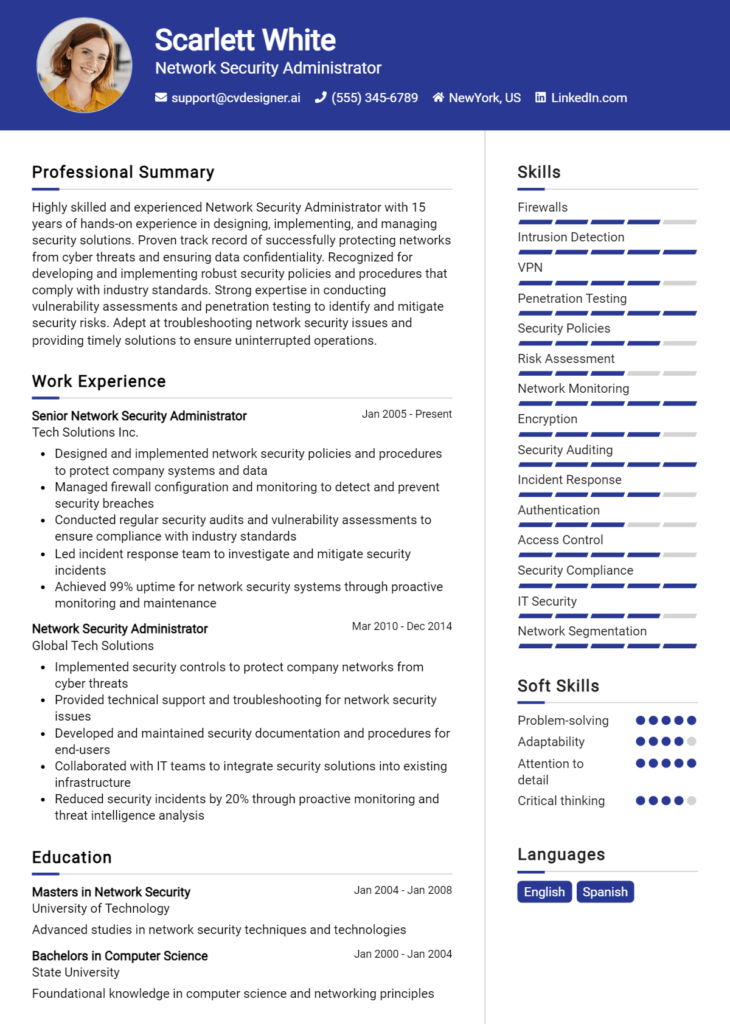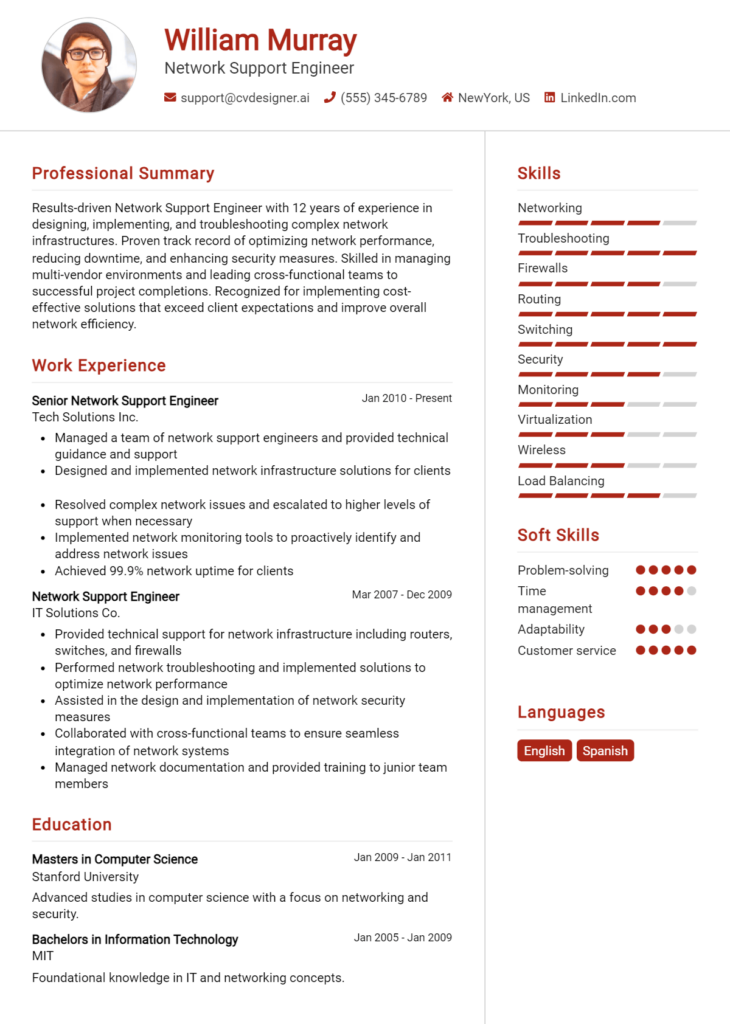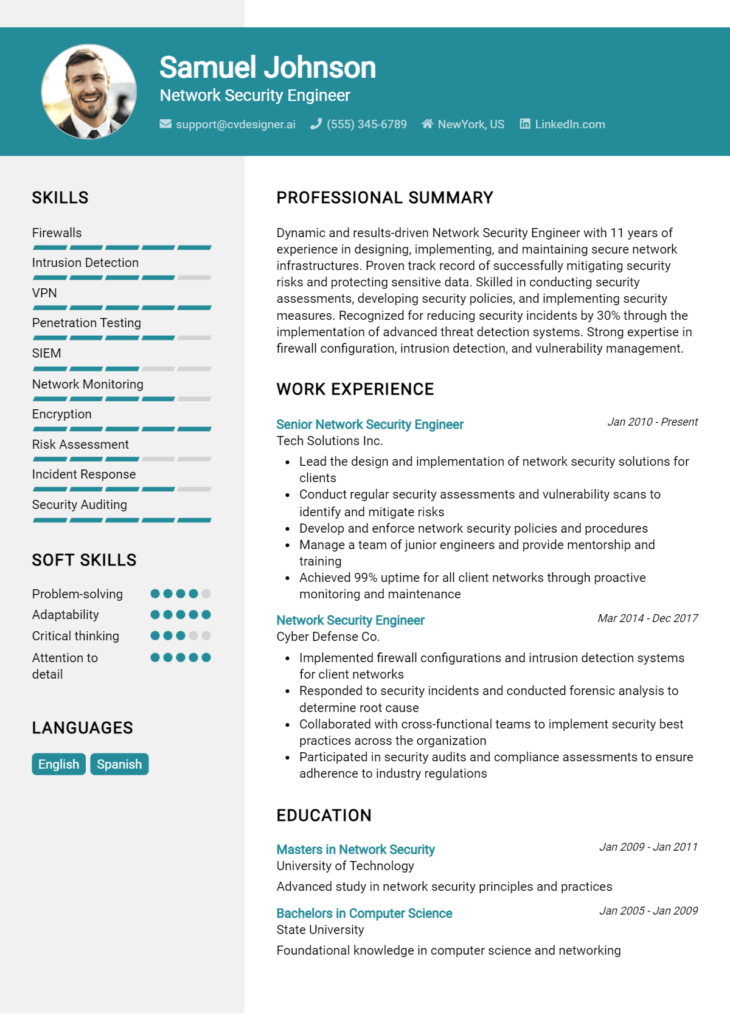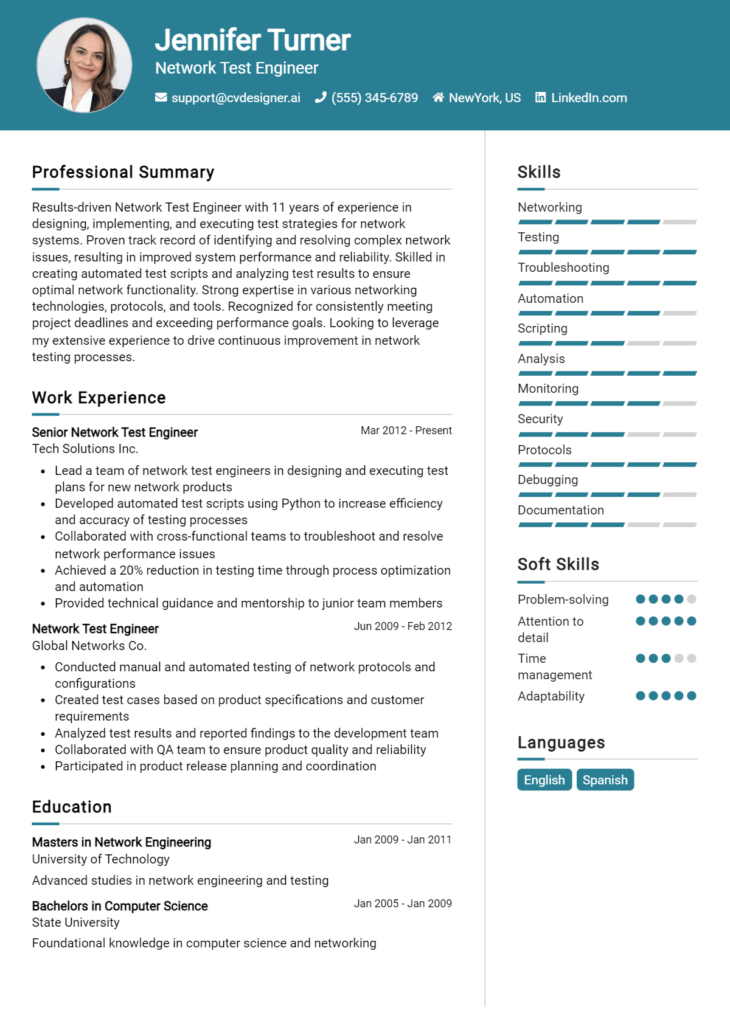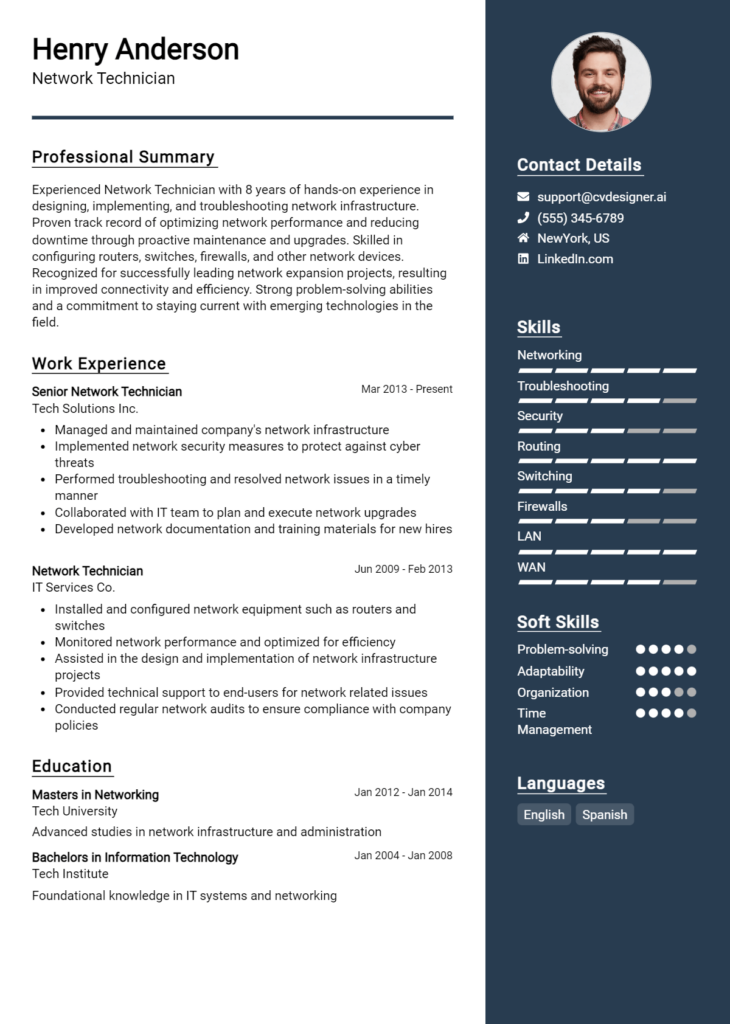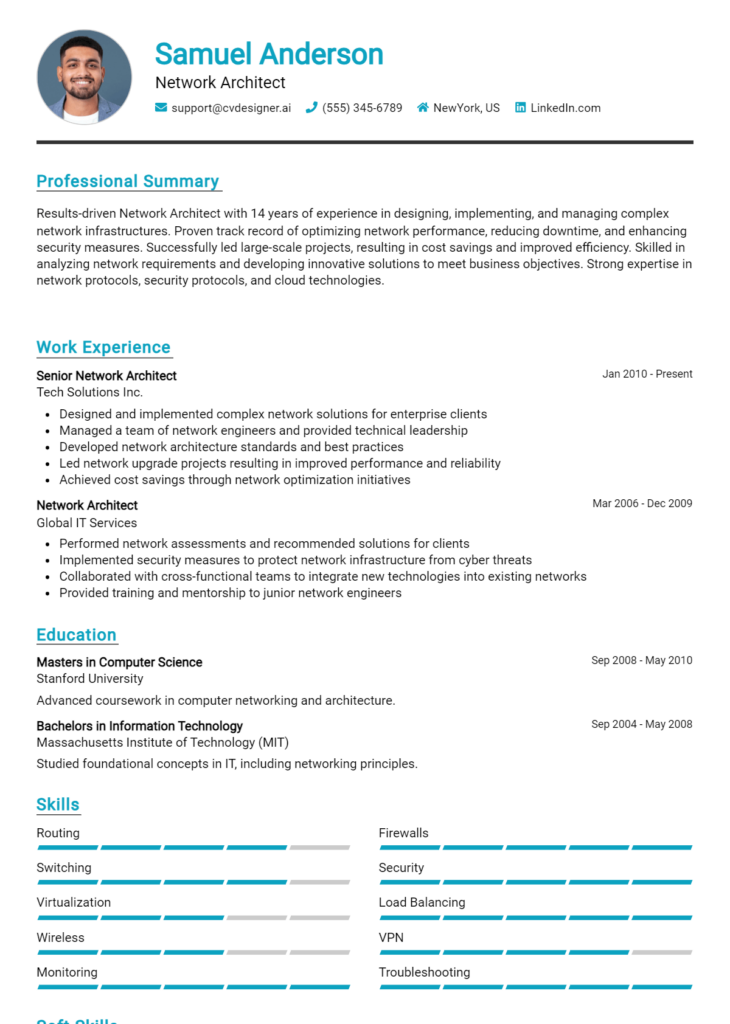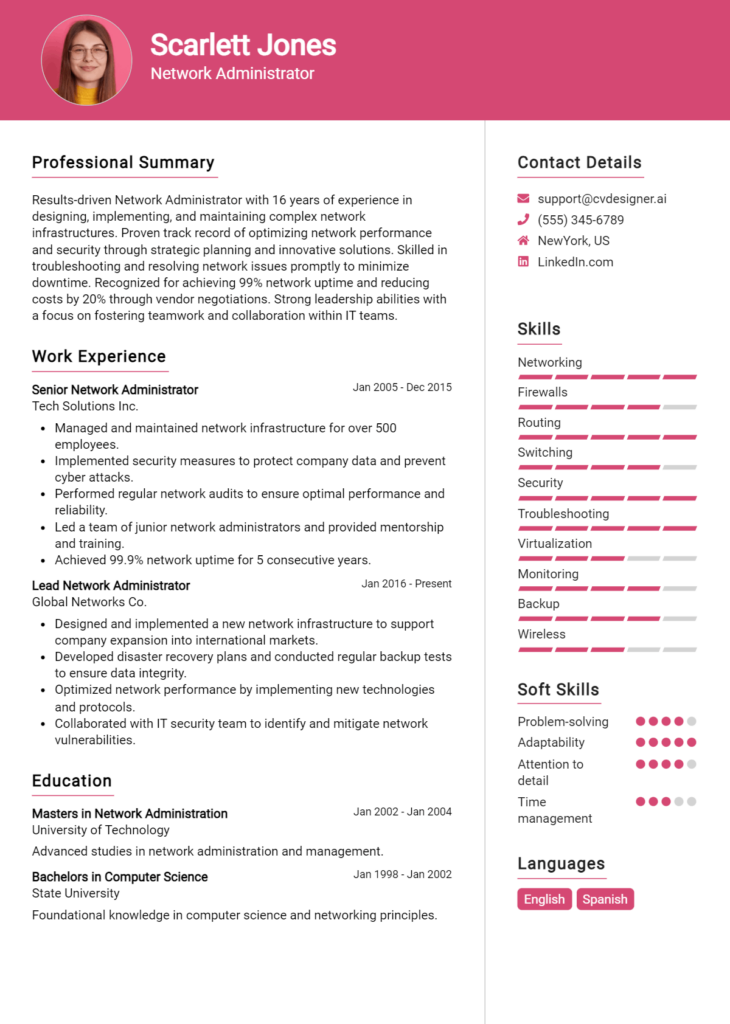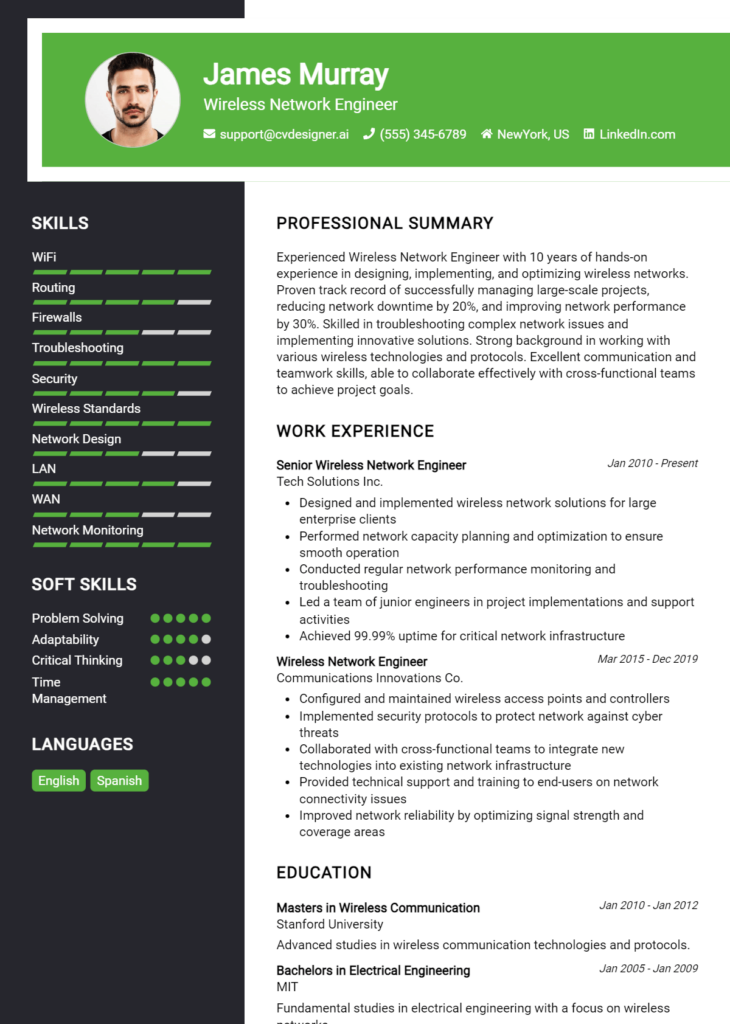Most Popular Network Engineer Resume Examples
Explore additional Network Engineer resume samples and guides and see what works for your level of experience or role.
As the backbone of modern communication, network engineers play a critical role in ensuring that organizations stay connected and operational. Their expertise in designing, implementing, and maintaining network infrastructure is essential for seamless data exchange and security in today’s digital landscape. However, to stand out in a competitive job market, a well-crafted resume is paramount. An effective resume not only highlights your technical skills and experience but also tells your unique professional story, making it easier for hiring managers to recognize your potential.
In this comprehensive resume writing guide for network engineers, we will cover essential topics to help you create a standout document. First, we’ll delve into the key responsibilities and skills that employers look for in a network engineer, ensuring you know what to emphasize. Next, we’ll discuss the best resume formats to use for maximum impact and highlight common mistakes to avoid that could hinder your chances of landing an interview. We will also provide resume examples tailored for various experience levels, giving you a clear picture of how to structure your own. Additionally, you’ll find valuable tips on effective resume writing and guidance on selecting the right resume templates to enhance your presentation. By the end of this guide, you’ll be equipped with all the tools you need to create a resume that captures attention and opens doors to exciting career opportunities.
Key Responsibilities and Skills for a Network Engineer
As a Network Engineer, you play a crucial role in designing, implementing, and managing the network infrastructure of an organization. Your responsibilities encompass a wide range of tasks that ensure seamless connectivity and optimal network performance. Here are the key responsibilities typically associated with the role:
- Design and implement network solutions, including LANs, WANs, and VPNs.
- Monitor network performance and troubleshoot issues to ensure reliable connectivity.
- Configure and maintain network hardware, such as routers, switches, and firewalls.
- Collaborate with cross-functional teams to assess network needs and develop effective strategies.
- Ensure network security by implementing appropriate measures and protocols.
- Keep documentation up to date and maintain network configuration records.
- Stay informed about emerging technologies and best practices in networking.
To excel in this role, a Network Engineer should possess the following essential skills:
- Proficiency in network protocols (e.g., TCP/IP, BGP, OSPF).
- Strong knowledge of network hardware and software.
- Experience with network monitoring tools and troubleshooting techniques.
- Familiarity with security protocols and best practices.
- Excellent analytical and problem-solving abilities.
- Effective communication skills for collaboration with team members and stakeholders.
- Knowledge of cloud networking and virtualization technologies is a plus.
When crafting your resume, it’s important to highlight these skills effectively in the skills section. Tailoring your responsibilities and skills to align with the specific job description will enhance your chances of standing out to potential employers. Additionally, consider how these skills could be relevant in creating a strong CV. Demonstrating your expertise and experience in these areas not only showcases your qualifications but also reinforces your fit for the role you are applying for.
Best Resume Format and Structure for a Network Engineer
When creating a resume for a Network Engineer position, it’s essential to choose a format that effectively showcases your skills and experience. Here’s a detailed guide on the best resume format and structure:
Contact Information
Begin with your contact details at the top of your resume. This should include:
- Full Name
- Phone Number
- Email Address
- LinkedIn Profile (optional)
- Location (City, State)
Ensure this information is clear and easy to read, as it allows potential employers to contact you quickly.
Professional Summary
Write a concise professional summary that highlights your expertise, years of experience, and key skills. This section should be tailored to the specific job you are applying for and should reflect your career goals. Aim for 2-4 sentences that demonstrate your value as a Network Engineer, emphasizing your proficiency in network configuration, maintenance, and troubleshooting.
Work Experience
List your work experience in reverse chronological order, starting with your most recent job. For each position, include:
- Job Title
- Company Name
- Location (City, State)
- Dates of Employment (Month/Year – Month/Year)
- Bullet points describing your responsibilities and achievements
Focus on quantifiable achievements (e.g., "Reduced network downtime by 20% through proactive monitoring") and use action verbs to convey your contributions effectively.
Education
Include your academic qualifications. This section typically includes:
- Degree Earned (e.g., Bachelor of Science in Computer Networking)
- Institution Name
- Location (City, State)
- Graduation Date (Month/Year)
If you have relevant coursework or projects, consider adding them to enhance this section.
Skills
Create a skills section that highlights both technical and soft skills relevant to the Network Engineer role. Include:
- Networking Protocols (e.g., TCP/IP, BGP, OSPF)
- Hardware and Software Expertise (e.g., routers, switches, firewall configurations)
- Network Monitoring Tools (e.g., Wireshark, SolarWinds)
- Troubleshooting and Problem-solving Skills
- Communication and Team Collaboration Skills
Tailor this section based on the job description to ensure you are aligning your skills with what the employer is seeking.
Certifications
List any relevant certifications that demonstrate your qualifications and commitment to professional development. Include:
- Certification Name (e.g., Cisco Certified Network Associate (CCNA), CompTIA Network+)
- Issuing Organization
- Date Obtained (Month/Year)
Certifications add credibility to your resume and show your dedication to staying current in the field.
Additional Sections
Depending on your background, you may want to include other sections such as:
- Projects: Briefly describe relevant projects you have worked on, particularly if they demonstrate skills or technologies listed in the job description.
- Volunteer Experience: Highlight any volunteer work that may showcase your networking skills or teamwork.
Resume Format Tips
- Choose a clean, professional layout with clear headings and ample white space to enhance readability.
- Use a standard font (e.g., Arial, Calibri) in a size between 10-12 points.
- Keep your resume to one or two pages, focusing on the most relevant information.
- Use bullet points for clarity and to make your achievements stand out.
Complementing Cover Letter Format
A well-structured resume should be complemented by a corresponding cover letter. Use a similar format and style to ensure consistency. The cover letter should introduce you, explain your interest in the position, and elaborate on key achievements from your resume, providing context and demonstrating your enthusiasm for the role.
By following this guide, you can create a compelling resume that effectively highlights your qualifications as a Network Engineer and enhances your chances of landing an interview.
Writing Tips and Best Practices for a Network Engineer Resume
When crafting a resume as a Network Engineer, it's essential to present your technical skills and achievements clearly and effectively. Start by tailoring your resume to the specific job you are applying for, showcasing relevant experience and expertise. Use action verbs to convey your contributions and impact in previous roles, and quantify your achievements whenever possible to demonstrate your effectiveness. Incorporate industry-specific keywords to ensure your resume resonates with hiring managers and applicant tracking systems. Additionally, maintaining a clean and professional layout is crucial, so consider utilizing resume writing tips to enhance the overall presentation. Remember, many of these practices also apply when drafting a compelling cover letter.
- Use strong action verbs such as "designed," "implemented," and "optimized" to describe your responsibilities.
- Quantify your achievements with specific metrics, such as "reduced network downtime by 30%" or "managed a team of 5 engineers."
- Tailor your resume to include relevant keywords from the job description, such as "Cisco," "firewall," or "VPN."
- Highlight certifications like CCNA, CCNP, or other relevant qualifications to showcase your expertise.
- Organize your skills into categories (e.g., networking protocols, security, hardware) for easy readability.
- Include a summary statement at the top of your resume to provide a snapshot of your experience and career goals.
- Use bullet points for clarity and to make your resume easier to skim.
- Keep your resume to one or two pages, focusing on the most relevant information to the position.
Common Mistakes to Avoid in a Network Engineer Resume
When crafting a resume for a Network Engineer position, it's crucial to present your skills and experience in a clear and compelling manner. Unfortunately, many candidates make common mistakes that can undermine their chances of landing an interview. To ensure your resume stands out for the right reasons, be mindful of the following pitfalls:
- Overloading with Information: Including too much detail can overwhelm the reader. Focus on relevant information that highlights your qualifications.
- Using Generic Descriptions: Avoid vague phrases like “responsible for” or “worked on.” Instead, use action verbs and specific examples to showcase your accomplishments.
- Neglecting Keywords: Failing to incorporate industry-specific keywords can lead to your resume being overlooked by Applicant Tracking Systems (ATS).
- Inconsistent Formatting: Ensure that your formatting is uniform throughout the document. Inconsistent fonts, sizes, and styles can appear unprofessional.
- Ignoring Achievements: Highlighting tasks instead of achievements can make your resume less impactful. Quantify your contributions whenever possible.
- Lack of Tailoring: Sending the same resume for every job application can be detrimental. Tailor your resume to match the specific requirements of each position.
- Omitting Soft Skills: Technical expertise is crucial, but don’t forget to include soft skills like communication and teamwork, which are essential for collaboration in network environments.
- Poor Grammar and Spelling: Simple errors can create a negative impression. Always proofread your resume multiple times or use tools to catch mistakes.
- Using an Unprofessional Email: Ensure your email address is professional. Avoid using nicknames or unprofessional handles.
- Overly Long Resumes: Keep your resume concise. One to two pages is typically ideal, especially for early to mid-career professionals.
To avoid these common errors, consider reviewing this list of common mistakes to avoid in a resume. Additionally, don’t overlook the importance of your cover letter. Check for common cover letter mistakes that could impact your overall application.
Sample Network Engineer Resumes
A well-crafted resume is crucial for securing a job as a Network Engineer, whether you're an experienced professional, an entry-level candidate, or someone transitioning from a different career. Below are three sample resumes tailored to these specific profiles, showcasing relevant skills, experiences, and achievements. Feel free to explore more resume templates for additional inspiration. Corresponding cover letter examples can also be beneficial in creating a comprehensive job application package.
Experienced Network Engineer Resume Sample
John Doe
123 Tech Lane
Tech City, CA 91234
(123) 456-7890
john.doe@email.com
Professional Summary
Seasoned Network Engineer with over 8 years of experience in designing, implementing, and managing complex network infrastructures. Proven ability to optimize network performance and enhance security protocols. Adept at collaborating with cross-functional teams to drive project success.
Technical Skills
- Network Design and Implementation
- Cisco Routers and Switches
- Network Security Protocols
- Troubleshooting and Analysis
- Firewall Management (Palo Alto, Fortinet)
- VPN Configuration
- VoIP Technologies
Professional Experience
Senior Network Engineer
ABC Technologies, Tech City, CA
March 2018 - Present
- Designed and implemented a scalable network architecture that improved bandwidth utilization by 30%.
- Led a team of 5 engineers in a major network upgrade project, resulting in a 25% increase in reliability.
- Developed and deployed security measures that reduced vulnerabilities by 40%.
Network Engineer
XYZ Solutions, Tech City, CA
June 2015 - February 2018
- Configured and maintained Cisco routers and switches in a multi-site environment.
- Conducted regular network performance assessments, identifying areas for improvement and implementing solutions.
- Assisted in the deployment of VoIP systems, enhancing communication capabilities for clients.
Education
Bachelor of Science in Computer Science
University of Tech, Tech City, CA
Graduated: May 2015
Entry-Level Network Engineer Resume Sample
Jane Smith
456 Network Ave
Network Town, CA 54321
(987) 654-3210
jane.smith@email.com
Professional Summary
Motivated and detail-oriented recent graduate with a Bachelor’s degree in Information Technology. Eager to leverage academic knowledge and internship experience in a dynamic network engineering role. Strong understanding of networking protocols and troubleshooting techniques.
Technical Skills
- Basic Network Configuration
- TCP/IP and OSI Models
- Cisco Packet Tracer
- Network Monitoring Tools (Wireshark)
- Help Desk Support
- Problem-Solving Skills
Professional Experience
Network Intern
Tech Innovations, Network Town, CA
June 2022 - August 2022
- Assisted in configuring and troubleshooting network devices under the supervision of senior engineers.
- Participated in network monitoring and performance analysis, contributing to a 15% reduction in downtime.
- Supported end-users by diagnosing and resolving connectivity issues.
Education
Bachelor of Science in Information Technology
Tech University, Network Town, CA
Graduated: May 2023
Career Changer Resume Sample
Mark Johnson
789 IT Road
Cityville, CA 67890
(321) 654-9870
mark.johnson@email.com
Professional Summary
Dynamic IT professional with 5 years of experience in technical support and system administration, seeking to transition into network engineering. Strong problem-solving skills with a solid foundation in network fundamentals and a passion for learning new technologies.
Technical Skills
- Network Troubleshooting
- System Administration (Windows, Linux)
- Knowledge of Networking Protocols (HTTP, FTP, DHCP)
- Customer Service Expertise
- Project Management
Professional Experience
IT Support Specialist
Tech Solutions, Cityville, CA
January 2019 - Present
- Provided technical support to over 200 users, resolving issues related to network connectivity and software applications.
- Collaborated with network engineers to document and troubleshoot network incidents, improving resolution times by 20%.
- Conducted training sessions for staff on best practices for network security and usage.
System Administrator
Future Tech, Cityville, CA
June 2017 - December 2018
- Managed server configurations and performed regular updates to ensure optimal performance.
- Assisted in the implementation of new network solutions, gaining hands-on experience in network management.
Education
Associate Degree in Information Technology
Community College, Cityville, CA
Graduated: May 2017
By tailoring your resume for your specific experience level and career goals, you can effectively capture the attention of hiring managers. Don’t forget to explore more resume templates and corresponding cover letter examples to complete your job application package.
Checklist for a Network Engineer Resume
- Proofread for Errors: Carefully review your resume for spelling, grammar, and punctuation mistakes. Consider using tools like Grammarly or running it by a colleague for a second opinion.
- Consistent Formatting: Ensure that fonts, sizes, bullet points, and spacing are consistent throughout the document. This helps create a professional and polished appearance.
- Tailor to the Job: Customize your resume for each position you apply to by incorporating relevant keywords from the job description. Highlight your experience and skills that align with the specific role.
- Highlight Key Skills: Clearly list technical skills relevant to network engineering, such as proficiency in networking protocols, hardware, and software. Use bullet points for easy readability.
- Focus on Achievements: Instead of simply listing job duties, emphasize your accomplishments and contributions in previous roles. Use quantifiable metrics where possible to demonstrate impact.
- Include Certifications: List any relevant certifications, such as CCNA, CCNP, or CompTIA Network+, which showcase your qualifications and commitment to the field.
- Optimize Length: Aim for a one-page resume unless you have extensive experience that necessitates a second page. Be concise and include only the most relevant information.
- Use Action Verbs: Start bullet points with strong action verbs (e.g., designed, implemented, managed) to convey your responsibilities and achievements more dynamically.
- Contact Information: Double-check that your contact information is current and prominently displayed at the top of your resume, including your LinkedIn profile if applicable.
- Organize with an AI Resume Builder: Consider using an AI resume builder to ensure all elements of your resume are well-organized and visually appealing.
A similar checklist can also be followed when creating a CV or cover letter.
Key Takeaways for a Network Engineer Resume Guide
As you embark on crafting your Network Engineer resume, remember that a well-structured and tailored document can significantly enhance your chances of landing your desired position. Utilize the examples and tips provided in this guide to showcase your technical expertise and relevant experience effectively. Take the next step by downloading a professional resume template from resume templates to help organize your information succinctly. Additionally, consider using our cover letter templates to create a compelling introduction to your application. For a streamlined approach, our best resume maker is a fantastic resource that can simplify the process while ensuring quality. Remember, applying similar guidelines will not only aid in developing an impactful resume but also help you produce a standout CV and cover letter. Start crafting your professional narrative today!
